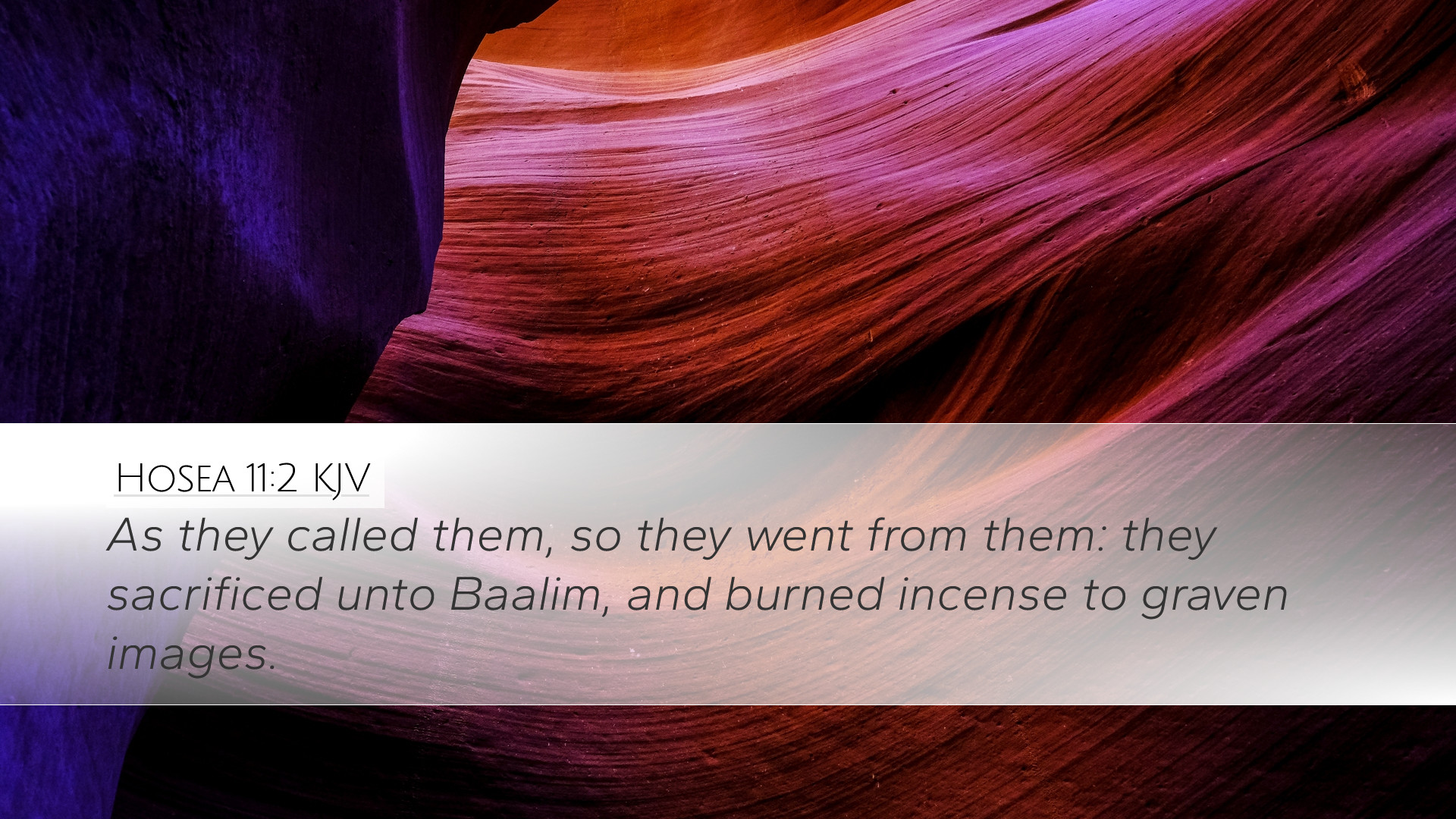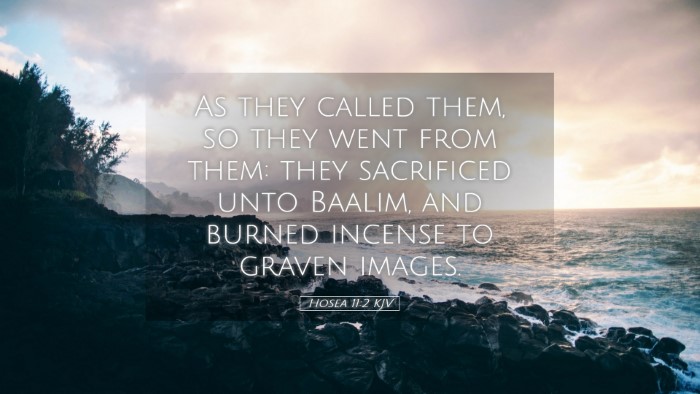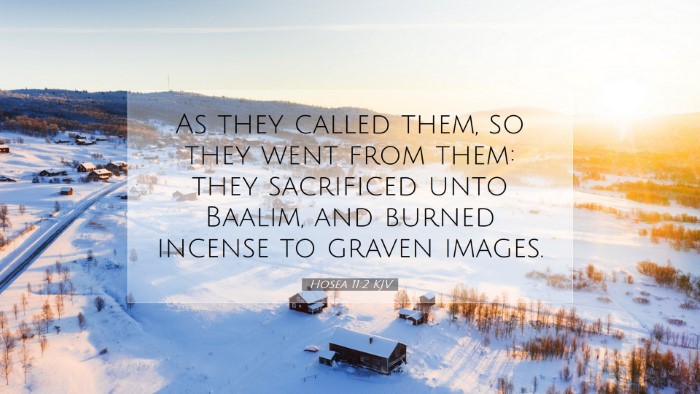Old Testament
Genesis Exodus Leviticus Numbers Deuteronomy Joshua Judges Ruth 1 Samuel 2 Samuel 1 Kings 2 Kings 1 Chronicles 2 Chronicles Ezra Nehemiah Esther Job Psalms Proverbs Ecclesiastes Song of Solomon Isaiah Jeremiah Lamentations Ezekiel Daniel Hosea Joel Amos Obadiah Jonah Micah Nahum Habakkuk Zephaniah Haggai Zechariah MalachiHosea 11:2
Hosea 11:2 KJV
As they called them, so they went from them: they sacrificed unto Baalim, and burned incense to graven images.
Hosea 11:2 Bible Commentary
Commentary on Hosea 11:2
The verse Hosea 11:2 states: "As they called them, so they went from them: they sacrificed unto Baalim, and burned incense to graven images." This verse captures the essence of Israel's disobedience and the consequences of their actions in relation to divine calling and idolatry. This commentary will synthesize insights from various public domain sources to provide a deeper understanding of its theological implications.
Contextual Background
The Book of Hosea addresses the spiritual infidelity of Israel, portraying Yahweh's enduring love despite their recurrent unfaithfulness. Hosea, as a prophet, utilizes his personal experiences and the metaphor of marriage to illustrate God's relationship with His people. The context surrounding chapter 11 reveals a history of rebellion, a reiteration of God's persistent call, and the people's stubbornness in forsaking Him.
- Historical Context: Hosea prophesied during a time of political strife and moral decay in Israel. The people were heavily influenced by surrounding nations, particularly in their worship practices, which included the veneration of Baal.
- Symbolism of 'Calling': The phrase 'as they called them' indicates the repeated divine summons for Israel to return to faithfulness, highlighting God's proactive steps in reaching out to His people.
Insights from Commentaries
Matthew Henry's Perspective
Matthew Henry points out that the phrase "as they called them" reflects a dual aspect of divine and human agency; it shows God calling Israel and the people's subsequent response of rebellion. Henry emphasizes the idea of divine invitation being met with human rejection. He notes that God called the children of Israel, but they, in return, turned away to idolatry, epitomized in their sacrifices to Baal. This illustrates a tragic disconnection between divine hope and human betrayal.
Albert Barnes' Remarks
Albert Barnes offers a keen examination of the spiritual decay reflected in this passage. He notes that 'they sacrificed unto Baalim' signifies a profound apostasy amidst God's calling. Barnes elaborates that this not only indicates a physical turning away but a crucial spiritual decline characterized by disobedience. The phrase 'burned incense to graven images' serves as a stark reminder of Israel's preference for tangible, yet false, deities over the living God, thus highlighting a fundamental betrayal. Barnes stresses that this behavior was not just national but deeply personal, implicating individuals within the community in the broader narrative of disobedience.
Adam Clarke's Analysis
Adam Clarke's commentary emphasizes the emotional undertones of this verse. He interprets it as an expression of divine grief over Israel's choices. Clarke's insight into the word 'called' denotes an ongoing relationship that the people consistently chose to reject. He highlights the depth of God's love, evidenced in His unwavering patience despite the constant rebellion. Clarke also notes that the phrase 'sacrificed unto Baalim' is indicative of a series of deliberate choices by the Israelites, showcasing a rejection of God's sovereignty in favor of local idols.
Theological Reflections
This verse serves as a crucial point for theological reflection, particularly concerning the nature of sin, grace, and human response to God's call. Several themes emerge worth considering:
- The Call of God: God's calling is persistent and clear, yet it necessitates a response from humanity. Pastors and theologians can draw parallels between God's call to Israel and His call to the church today, emphasizing the ever-present choice of fidelity over idolatry.
- Apostasy and Idolatry: The worship of Baal symbolizes the myriad modern-day idols that compete with the worship of the true God. This encourages a biblical examination of current practices and beliefs that may detract from faithfulness to God.
- Grace in Rebellion: Despite Israel's unfaithfulness, God's love is unyielding. This profound truth provides a foundation for understanding grace, as seen through the lens of God's ongoing relationship with His covenant people, reminding scholars of the centrality of grace in the message of the gospel.
Conclusion
The study of Hosea 11:2 reveals a deeply rooted narrative of love and rejection, urging reflection on the covenant relationship between God and His people. By synthesizing the insights of Matthew Henry, Albert Barnes, and Adam Clarke, we are reminded of the dangers of spiritual infidelity and the enduring call of our God who continuously seeks reconciliation. This verse invites pastors, students, theologians, and scholars to engage in meaningful discussions about faithfulness amidst a culture of competing allegiances, fostering a return to genuine worship of the living God.


